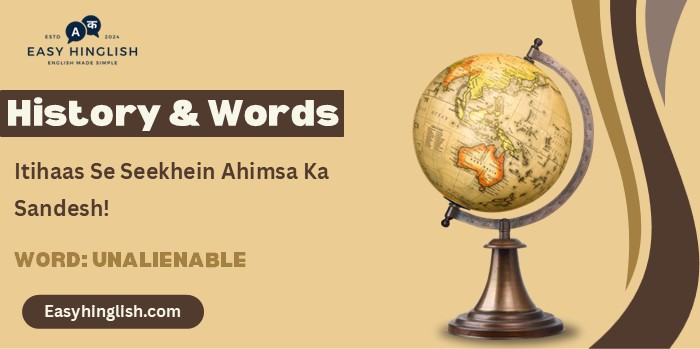History & Words: ‘Unalienable’ (4 July)
Welcome to ‘History & Words’! 🌟 Main hoon Prashant, Wordpandit aur Learning Inc. Network ka founder. Yeh series language learning aur historical context ko connect karti hai, taaki vocabulary improve ho aur history ki understanding bhi deep ho.
Chaliye, shabdon ki iss journey par mere saath chaliye aur naye naye words explore karte hain! 😊
📚 Table of Contents
🔍 Word of the Day: Unalienable
Pronunciation: /ˌʌnˈeɪliənəbəl/ (un-AY-lee-uh-nuh-bul)
Meaning: Aise adhikar ya rights jo kisi bhi insaan se cheene nahi ja sakte, aur jinka transfer ya denial possible nahi hota.
🌍 Parichay (Introduction)
4 July 1776—ek aisa din jo duniya ke sabse prabhavshali political documents me se ek ke janm ka gavaah bana: The Declaration of Independence.
Is document ne declare kiya:
“All men are created equal… they are endowed by their Creator with certain unalienable Rights, that among these are Life, Liberty and the pursuit of Happiness.”
Yeh shabd sirf ek legal ya political statement nahi tha—yeh ek philosophical aur moral revolution tha. “Unalienable” ek aisa concept hai jo batata hai ki kuch rights insan ke janm se hi uske saath hote hain, jise koi sarkar, raja, ya samaj chheen nahi sakta.
🌱 Shabd ka Utpatti (Etymology)
“Unalienable” bana hai:
- Un-: Prefix jo denial ya negation dikhata hai
- Alienable: Latin root alienare se, jiska arth hai “to transfer” ya “to give away”
- Unalienable: Matlab aise rights jo kisi bhi tarah transfer nahi kiye ja sakte
Yeh word 17th century me English me popular hua, aur 18th century ke Enlightenment thinkers ne ise deeply philosophical dimension diya.
📖 Mahatvapurn Shabdavali (Key Vocabulary)
- 🔑 Natural Rights – Aise adhikar jo har insaan ke paas janm ke saath hote hain
- 🔑 Liberty – Swatantrata; bina dar ke jeene aur choose karne ka adhikar
- 🔑 Inalienable – “Unalienable” ka hi ek variant spelling, but same meaning
- 🔑 Sovereignty – Apne aap ke upar control; self-rule ya self-determination
- 🔑 Consent of the Governed – Loktantra ka principle, jisme government logon ke will se banai jaati hai
🏛️ Itihasik Sandarbh (Historical Context)
18th century Enlightenment Europe me philosophers jaise John Locke, Jean-Jacques Rousseau, aur Montesquieu ne human rights aur government ke relation ko redefine kiya.
- Locke ne kaha: Life, Liberty, Property are natural rights
- American revolutionaries ne Locke ke principles ko adapt kiya
- Declaration of Independence ke author Thomas Jefferson ne “unalienable rights” phrase use karke ek moral and political doctrine establish kiya
Ye idea British monarchy ke absolute power ke against gaya—aur ek naye democratic order ka foundation ban gaya.
⏳ Samayrekha (Timeline)
- 1689: John Locke publishes Two Treatises of Government, jisme natural rights ka concept diya
- 1751–1776: Enlightenment thinkers ka influence American colonies me badhta hai
- 4 July 1776: Declaration of Independence sign hota hai, “unalienable Rights” ka phrase history me immortal hota hai
- 1789: French Revolution me bhi human rights ki echo hoti hai
- 1948: Universal Declaration of Human Rights me inalienable rights ka modern version samne aata hai
- 21st Century: Global constitutions aur human rights documents me “unalienable” ka essence bana hua hai
🌟 Is Din ka Mahatva (The Day’s Significance)
4 July har saal sirf ek national holiday nahi hota—yeh human dignity aur freedom ka global symbol hai.
- ✅ “Unalienable Rights” ne ek aisa moral foundation diya jisme governments accountable bani
- ✅ Civil rights movements, women’s suffrage, LGBTQ+ rights—sabne isi principle par khud ko build kiya
- ✅ Duniya bhar me oppressed logon ke liye yeh ek powerful phrase ban gaya
Yeh din yaad dilata hai ki freedom ek gift nahi—janm siddh adhikar hai.
💬 Prasiddh Ukti (Quote)
“We hold these truths to be self-evident, that all men are created equal…”
— The Declaration of Independence, 1776
Yeh quote har insaan ke basic value aur dignity ko affirm karta hai, chahe wo kisi bhi jaat, dharm, ya country ka ho.
🔮 Aaj Ka Matlab aur Chintan (Modern Usage & Reflection)
Aaj ke globalized aur digital world me bhi “unalienable” ek relevant aur urgent concept hai:
- ✅ Privacy, freedom of speech, aur internet access bhi unalienable rights ke modern forms ban chuke hain
- ✅ Social justice movements har jagah yahi demand karte hain—equal access to unalienable rights
- ✅ Courts, NGOs, aur international bodies ka kaam isi premise pe based hai ki kuch rights har human ko naturally milte hain
Ye term hume yaad dilata hai ki humanity ki asli shakti uski dignity me hoti hai—aur woh kabhi alienate nahi ki ja sakti.
🏛️ Virast (Legacy)
- ✅ “Unalienable” ne political aur moral thought ko redefine kiya
- ✅ US Constitution aur Bill of Rights me yeh foundational idea ban gaya
- ✅ Isne democracy ko sirf ek system nahi, ek ethical contract bana diya
- ✅ Global freedom struggles ne is term ko adopt kiya—from India to South Africa
Yeh legacy har generation ko yeh responsibility deti hai ki wo in rights ko protect kare aur expand kare.
🔍 Tulnatmak Vishleshan (Comparative Analysis)
“Unalienable” vs. “Inalienable”:
- Technically, dono ka meaning same hai
- “Unalienable” Declaration of Independence me use hua; “Inalienable” zyada modern legal texts me common hai
- “Alienable” rights transfer ho sakte hain (jaise property), lekin “unalienable” nahi
Yeh comparison batata hai ki kuch values timeless hote hain—unhe law ya contract se badla nahi ja sakta.
💡 Kya Aapko Pata Hai? (Did You Know?)
🎓 Antim Vichar (Conclusion)
“Unalienable” ek shabd nahi, ek moral compass hai. Yeh hume yaad dilata hai ki har insan ka jeevan, swatantrata, aur happiness ka adhikar uske saath janm leta hai.
4 July 1776 ne sirf ek country ko azaadi nahi di—usne duniya bhar ke logon ke liye ek nayi language of freedom create ki.
Aaj bhi, jab bhi koi injustice ke khilaaf awaaz uthti hai, unke shabdon me yeh “unalienable” spirit hoti hai.
📚 Aage Padhne Ke Liye (Further Reading)
- 📖 The Declaration of Independence – Thomas Jefferson
- 📖 Two Treatises of Government – John Locke
- 📖 Common Sense – Thomas Paine
- 📖 A Theory of Justice – John Rawls
- 📖 Universal Declaration of Human Rights – United Nations, 1948








